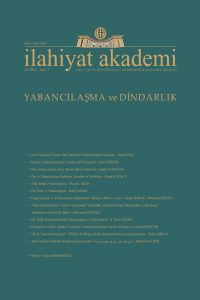Abstract
William Golding’s fifth novel, The Spire, set in the fourteenth century, tells the story of Dean Jocelin, who desires to erect a spire on the Cathedral of the Virgin Mary. As Dean Jocelin claims that his will is the God’s will that has been inspired to him by vision, he adheres to his will acquiescingly. However, all of the people around him, especially the master builder Roger Mason who doubts the endurance of a 400-foot-high spire, are against the idea of constructing it. The problematic proposition in the novel is whether Dean Jocelin is right or wrong trying to actualize his will that is going to result in material and spiritual losses. Is Dean Jocelin an especially faithful servant of God? Is he a latent or overt solipsist, sacrificing many lives for his will? Or is he just an ordinary person and as such, in possession of the human nature that is considered inherently evil by William Golding? This study will try to answer these questions by adopting the eighteenth-century philosopher Immanuel Kant’s ethics, which use good will, reason, and duty as measures of moral action, and which claims that all of these together bring freedom for human beings.
References
- Arslan, Ahmet, Felsefeye Giriş, Ankara, Adres Yayınları, 2009.
- Erkan, Mukadder, “A Critical Study on Golding’s novels, 1954-65: ‘Literary Features and Human Conflicts’ ”, Atatürk Üniversitesi Fen-Edebiyat Fakültesi Edebiyat Bilimleri Araştırma Dergisi, Erzurum, 1999, Number 25, 191-203.
- Fowler, Julianne, William Golding’s Definition of the Irrational: A Study of Themes and Images (Master’s Degree Thesis Kansas State Teac hers College, 1970, https://esirc.emporia.edu/bitstream/handle/123456789/2785/Fowler%201970.pdf?sequence=1 (13.08.2015)
- Friedman, Lawrence S., William Golding, New York, Continuum, 1993.
- Golding, William, A Moving Target, London, Faber, 1982.
- Golding, William, The Spire, London&Boston, Faber and Faber, 1990.
- Hallissy, Margaret, “ ‘No Innocent Work’: Theology and Psychology in William Golding’s The Spire”, Christianity and Literature, 1997, Vol. 47, No. 1, 37-56.
- Hallissy, Margaret, “Christianity, the Pagan Past, and the Rituals of Construction in William Goldings’s The Spire”, Critique: Studies in Contemporary Fiction, 2008, No: 49-3, 319-331.
- Kant, Immanuel, Groundwork of the Metaphysics of Morals, trans. Mary Gregor, Cambridge&New York, Cambridge UP, 2006.
- Kant, Immanuel, The Metaphysics of Morals, trans. Mary Gregor, Cambridge&New York, Cambridge UP, 1991.
- Kennard, Jean E., “William Golding: Island”, (Ed. Harold Bloom), Sin and Redemption, New York, Infobase Publishing, 2010, 105-133.
- Kinkead-Weekes, Mark and Gregor, Ian, William Golding: A Critical Study, London, Faber, 1984.
- Korsgaard, Christine, “ Kant’s Formula of Universal Law”, Pacific Philosophical Quarterly, 1985, Vol: 66, 24-47.
- McCarron, Kevin, William Golding, Plymouth, Northcote House Publishers, 1994.
- Mengüşoğlu, Takiyettin, Felsefeye Giriş, Ankara, Doğu Batı Yayınları, 2013.
- Pojman Louis P. and Fieser, James, Ethics: Discovering Right and Wrong, Boston, Wadsworth, 2012.
- Saavedra-Carballido, Jesús, “Will, Suffering and Liberation in William Golding’s The Spire”, Atlantis Journal of the Spanish Association of Anglo-American Studies, 2014, No: 36-1, 71-85.
- Scott, MaryLyn, “Universal Pessimist, Cosmic Optimist: William Golding”, Aurora Online, 1990, http://aurora.icaap.org/index.php/aurora/article/view/50/63 (25.08.2015)
- Temple, E. R. A., “William Golding’s The Spire: A Critique”, Renascence, 1968, Vol. 20, Issue 4, 171-173.
"Bu İş Tanrının İstenci mi?": William Golding'in Kule Romanında İstencin Sorgulanması / “Is it God’s Will in This Business?”: Will on Query in William Golding’s The Spire
Abstract
References
- Arslan, Ahmet, Felsefeye Giriş, Ankara, Adres Yayınları, 2009.
- Erkan, Mukadder, “A Critical Study on Golding’s novels, 1954-65: ‘Literary Features and Human Conflicts’ ”, Atatürk Üniversitesi Fen-Edebiyat Fakültesi Edebiyat Bilimleri Araştırma Dergisi, Erzurum, 1999, Number 25, 191-203.
- Fowler, Julianne, William Golding’s Definition of the Irrational: A Study of Themes and Images (Master’s Degree Thesis Kansas State Teac hers College, 1970, https://esirc.emporia.edu/bitstream/handle/123456789/2785/Fowler%201970.pdf?sequence=1 (13.08.2015)
- Friedman, Lawrence S., William Golding, New York, Continuum, 1993.
- Golding, William, A Moving Target, London, Faber, 1982.
- Golding, William, The Spire, London&Boston, Faber and Faber, 1990.
- Hallissy, Margaret, “ ‘No Innocent Work’: Theology and Psychology in William Golding’s The Spire”, Christianity and Literature, 1997, Vol. 47, No. 1, 37-56.
- Hallissy, Margaret, “Christianity, the Pagan Past, and the Rituals of Construction in William Goldings’s The Spire”, Critique: Studies in Contemporary Fiction, 2008, No: 49-3, 319-331.
- Kant, Immanuel, Groundwork of the Metaphysics of Morals, trans. Mary Gregor, Cambridge&New York, Cambridge UP, 2006.
- Kant, Immanuel, The Metaphysics of Morals, trans. Mary Gregor, Cambridge&New York, Cambridge UP, 1991.
- Kennard, Jean E., “William Golding: Island”, (Ed. Harold Bloom), Sin and Redemption, New York, Infobase Publishing, 2010, 105-133.
- Kinkead-Weekes, Mark and Gregor, Ian, William Golding: A Critical Study, London, Faber, 1984.
- Korsgaard, Christine, “ Kant’s Formula of Universal Law”, Pacific Philosophical Quarterly, 1985, Vol: 66, 24-47.
- McCarron, Kevin, William Golding, Plymouth, Northcote House Publishers, 1994.
- Mengüşoğlu, Takiyettin, Felsefeye Giriş, Ankara, Doğu Batı Yayınları, 2013.
- Pojman Louis P. and Fieser, James, Ethics: Discovering Right and Wrong, Boston, Wadsworth, 2012.
- Saavedra-Carballido, Jesús, “Will, Suffering and Liberation in William Golding’s The Spire”, Atlantis Journal of the Spanish Association of Anglo-American Studies, 2014, No: 36-1, 71-85.
- Scott, MaryLyn, “Universal Pessimist, Cosmic Optimist: William Golding”, Aurora Online, 1990, http://aurora.icaap.org/index.php/aurora/article/view/50/63 (25.08.2015)
- Temple, E. R. A., “William Golding’s The Spire: A Critique”, Renascence, 1968, Vol. 20, Issue 4, 171-173.
Details
| Primary Language | English |
|---|---|
| Journal Section | MAKALELER |
| Authors | |
| Publication Date | September 6, 2016 |
| Published in Issue | Year 2016 Issue: 3 |
Journal of Theology Academy is licensed under a Creative Commons Attribution-NonCommercial 4.0 International License (CC BY NC).


